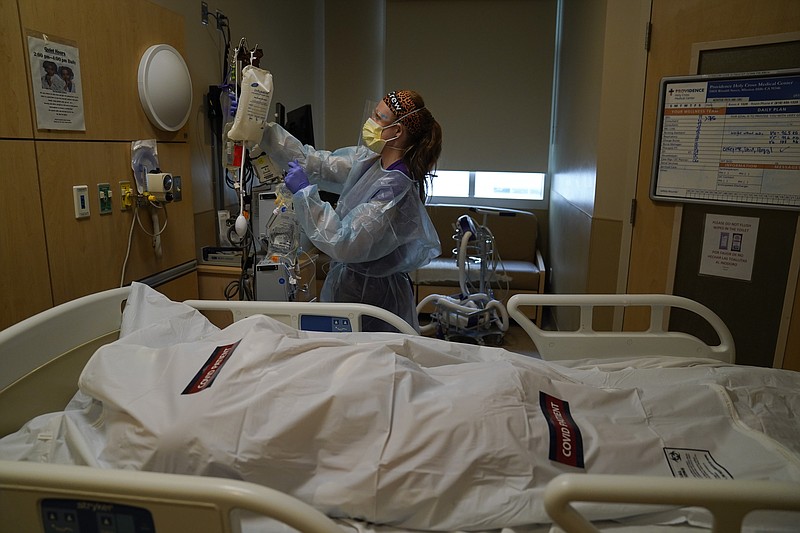As President Donald Trump entered the final year of his term last January, the U.S. recorded its first confirmed case of COVID-19.
Now, in his final hours in office, the pandemic's U.S. death toll has eclipsed 400,000. And the loss of lives is accelerating.
"This is just one step on an ominous path of fatalities," said Dr. Irwin Redlener, director of the National Center for Disaster Preparedness at Columbia University and one of many public health experts who contend the Trump administration's handling of the crisis led to thousands of avoidable deaths.
"Everything about how it's been managed has been infused with incompetence and dishonesty, and we're paying a heavy price," he said.
The 400,000-death toll, reported Tuesday by Johns Hopkins University, is greater than the population of New Orleans, Cleveland or Tampa, Florida. It's nearly equal to the number of American lives lost annually to strokes, Alzheimer's disease, diabetes, flu and pneumonia combined.
With more than 4,000 deaths recorded on some recent days - the most since the pandemic began - the toll by week's end will probably surpass the number of Americans killed in World War II.
"We need to follow the science and the 400,000th death is shameful," said Cliff Daniels, chief strategy officer for Methodist Hospital of Southern California, near Los Angeles. With its morgue full, the hospital has parked a refrigerated truck outside to hold the bodies of COVID-19 victims until funeral homes can retrieve them.
"It's so incredibly, unimaginably sad that so many people have died that could have been avoided," he said.
President-elect Joe Biden, who will be sworn in today, took part in an evening remembrance ceremony Tuesday near the Lincoln Memorial in Washington. The 400,000 dead were represented by 400 lights placed around the reflecting pool. The bell at the Washington National Cathedral tolled 400 times.
The U.S. accounts for nearly one of every five virus deaths reported worldwide, far more than any other country despite its great wealth and medical resources.
The coronavirus would almost certainly have posed a grave crisis for any president given its rapid spread and power to kill, experts on public health and government said.
However, Trump downplayed the threat and rejected scientific expertise.
The White House defended the administration this week.
"We grieve every single life lost to this pandemic, and thanks to the president's leadership, Operation Warp Speed has led to the development of multiple safe and effective vaccines in record time, something many said would never happen," White House spokesman Judd Deere said.
With deaths mounting in the New York City area last spring, Trump declared "war" on the virus. However, he was slow to invoke the Defense Production Act to secure desperately needed medical equipment.
When the Centers for Disease Control and Prevention tried to issue guidelines for reopening in May, Trump administration officials held them up.
"Why would you bench the CDC, the greatest fighting force of infectious disease in the world? Why would you call Tony Fauci a disaster?" asked Dr. Howard Markel, a medical historian at the University of Michigan. "It just doesn't make sense."
As governors came under pressure to reopen state economies, Trump pushed them to move faster, asserting the virus was fading.
In Republican-led states like Arizona that allowed businesses to reopen, hospitals and morgues filled with virus victims.
"It led to the tragically sharp partisan divide we've seen in the country on COVID, and that has fundamental implications for where we are now, because it means the Biden administration can't start over," Altman said. "They can't put the genie back in the bottle."
U.S. deaths from COVID-19 surpassed 100,000 in late May, then tripled by mid-December. Experts at the University of Washington project deaths will reach nearly 567,000 by May 1.
More than 120,000 patients with the virus are in the hospital in the U.S., according to the COVID Tracking Project, twice the number who filled wards during previous peaks. On a single day last week, the U.S. recorded more than 4,400 deaths.

